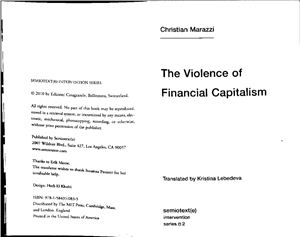Semiotext(e), 112 pages.
This first English-language edition of Christian Marazzi's most recent book, The Violence of Financial Capitalism, makes a groundbreaking work on the global financial crisis available to a new audience of readers. Marazzi, a leading figure in the European postfordist movement, first takes a broad look at the nature of the crisis and then provides the theoretical tools necessary to comprehend capitalism today, offering an innovative analysis of financialization in the context of postfordist cognitive capitalism. He argues that the processes of financialization are not simply irregularities between the traditional categories of wages, rent, and profit, but rather a new type of accumulation adapted to the processes of social and cognitive production today. The financial crisis, he contends, is a fundamental component of contemporary accumulation and not a classic lack of economic growth.
Marazzi shows that individual debt and the management of financial markets are actually techniques for goveing the transformations of immaterial labor, general intellect, and social cooperation. The financial crisis has radically undermined the very concept of unilateral and multilateral economico-political hegemony, and Marazzi discusses efforts toward a new geo-monetary order that have emerged around the globe in response. Offering a radically new understanding of the current stage of inteational economics as well as crucial post-Marxist guidance for confronting capitalism in its newest form, The Violence of Financial Capitalism is a valuable addition to the contemporary arsenal of postfordist thought. This expanded edition includes a new appendix for comprehending the esoteric neolanguage of financial capitalism—a glossary of "Words in Crisis," from "AAA" to "toxic asset."
This first English-language edition of Christian Marazzi's most recent book, The Violence of Financial Capitalism, makes a groundbreaking work on the global financial crisis available to a new audience of readers. Marazzi, a leading figure in the European postfordist movement, first takes a broad look at the nature of the crisis and then provides the theoretical tools necessary to comprehend capitalism today, offering an innovative analysis of financialization in the context of postfordist cognitive capitalism. He argues that the processes of financialization are not simply irregularities between the traditional categories of wages, rent, and profit, but rather a new type of accumulation adapted to the processes of social and cognitive production today. The financial crisis, he contends, is a fundamental component of contemporary accumulation and not a classic lack of economic growth.
Marazzi shows that individual debt and the management of financial markets are actually techniques for goveing the transformations of immaterial labor, general intellect, and social cooperation. The financial crisis has radically undermined the very concept of unilateral and multilateral economico-political hegemony, and Marazzi discusses efforts toward a new geo-monetary order that have emerged around the globe in response. Offering a radically new understanding of the current stage of inteational economics as well as crucial post-Marxist guidance for confronting capitalism in its newest form, The Violence of Financial Capitalism is a valuable addition to the contemporary arsenal of postfordist thought. This expanded edition includes a new appendix for comprehending the esoteric neolanguage of financial capitalism—a glossary of "Words in Crisis," from "AAA" to "toxic asset."

